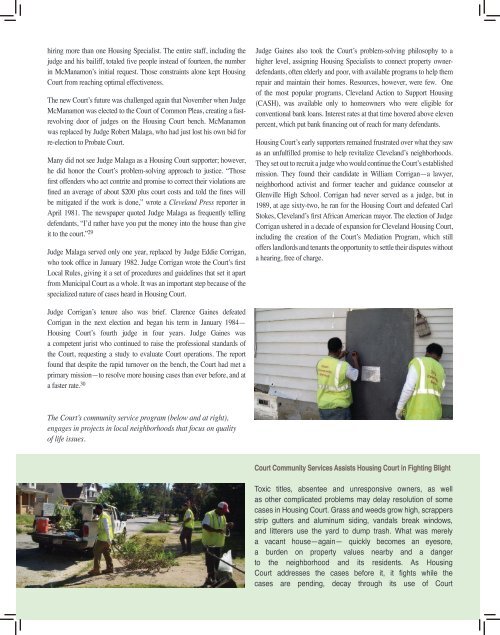Cleveland Housing Court
A detailed look at the 35th Anniversary of the Cleveland Municipal Court's Housing Division.
A detailed look at the 35th Anniversary of the Cleveland Municipal Court's Housing Division.
You also want an ePaper? Increase the reach of your titles
YUMPU automatically turns print PDFs into web optimized ePapers that Google loves.
hiring more than one <strong>Housing</strong> Specialist. The entire staff, including the<br />
in McManamon’s initial request. Those constraints alone kept <strong>Housing</strong><br />
<strong>Court</strong> from reaching optimal effectiveness.<br />
The new <strong>Court</strong>’s future was challenged again that November when Judge<br />
McManamon was elected to the <strong>Court</strong> of Common Pleas, creating a fastrevolving<br />
door of judges on the <strong>Housing</strong> <strong>Court</strong> bench. McManamon<br />
was replaced by Judge Robert Malaga, who had just lost his own bid for<br />
re-election to Probate <strong>Court</strong>.<br />
Many did not see Judge Malaga as a <strong>Housing</strong> <strong>Court</strong> supporter; however,<br />
he did honor the <strong>Court</strong>’s problem-solving approach to justice. “Those<br />
be mitigated if the work is done,” wrote a <strong>Cleveland</strong> Press reporter in<br />
April 1981. The newspaper quoted Judge Malaga as frequently telling<br />
defendants, “I’d rather have you put the money into the house than give<br />
it to the court.” 29<br />
Judge Malaga served only one year, replaced by Judge Eddie Corrigan,<br />
Local Rules, giving it a set of procedures and guidelines that set it apart<br />
from Municipal <strong>Court</strong> as a whole. It was an important step because of the<br />
specialized nature of cases heard in <strong>Housing</strong> <strong>Court</strong>.<br />
Judge Gaines also took the <strong>Court</strong>’s problem-solving philosophy to a<br />
higher level, assigning <strong>Housing</strong> Specialists to connect property ownerdefendants,<br />
often elderly and poor, with available programs to help them<br />
repair and maintain their homes. Resources, however, were few. One<br />
of the most popular programs, <strong>Cleveland</strong> Action to Support <strong>Housing</strong><br />
(CASH), was available only to homeowners who were eligible for<br />
conventional bank loans. Interest rates at that time hovered above eleven<br />
<strong>Housing</strong> <strong>Court</strong>’s early supporters remained frustrated over what they saw<br />
They set out to recruit a judge who would continue the <strong>Court</strong>’s established<br />
mission. They found their candidate in William Corrigan—a lawyer,<br />
neighborhood activist and former teacher and guidance counselor at<br />
Glenville High School. Corrigan had never served as a judge, but in<br />
1989, at age sixty-two, he ran for the <strong>Housing</strong> <strong>Court</strong> and defeated Carl<br />
Corrigan ushered in a decade of expansion for <strong>Cleveland</strong> <strong>Housing</strong> <strong>Court</strong>,<br />
including the creation of the <strong>Court</strong>’s Mediation Program, which still<br />
offers landlords and tenants the opportunity to settle their disputes without<br />
a hearing, free of charge.<br />
Judge Corrigan’s tenure also was brief. Clarence Gaines defeated<br />
Corrigan in the next election and began his term in January 1984—<br />
<strong>Housing</strong> <strong>Court</strong>’s fourth judge in four years. Judge Gaines was<br />
a competent jurist who continued to raise the professional standards of<br />
the <strong>Court</strong>, requesting a study to evaluate <strong>Court</strong> operations. The report<br />
found that despite the rapid turnover on the bench, the <strong>Court</strong> had met a<br />
primary mission—to resolve more housing cases than ever before, and at<br />
a faster rate. 30<br />
The <strong>Court</strong>’s community service program (below and at right),<br />
engages in projects in local neighborhoods that focus on quality<br />
of life issues.<br />
<strong>Court</strong> Community Services Assists <strong>Housing</strong> <strong>Court</strong> in Fighting Blight<br />
Toxic titles, absentee and unresponsive owners, as well<br />
as other complicated problems may delay resolution of some<br />
cases in <strong>Housing</strong> <strong>Court</strong>. Grass and weeds grow high, scrappers<br />
strip gutters and aluminum siding, vandals break windows,<br />
and litterers use the yard to dump trash. What was merely<br />
a vacant house—again— quickly becomes an eyesore,<br />
a burden on property values nearby and a danger<br />
to the neighborhood and its residents. As <strong>Housing</strong><br />
cases are pending, decay through its use of <strong>Court</strong>



